Abdullah Ocalan was born on April 4, 1949 and grew up in a large family in the village of Amara (called Omerli in Turkish) in Urfa’s Halfeti district, in northern Kurdistan (southeast Turkey). Ocalan studied political science at Ankara University, surmounting many of the obstacles to attaining higher education as a member of an ethnic minority in Turkey at the time. On November 27, 1978, during a time of great political upheaval in Turkey, Ocalan founded the Kurdistan Workers’ Party (PKK). The PKK was a revolutionary left-wing political organization initially dedicated to the creation of an independent Kurdish state. Following the 1980 Turkish military coup-d’état, the government clamped down heavily on hundreds of thousands of real and perceived opponents including the Kurds of Turkey. Against the backdrop of a deterioriating situation in Turkey, the PKK launched a campaign of armed struggle against the Turkish state on August 15, 1984. Ocalan led the PKK through over a decade of armed struggle against Turkey before being abducted on February 15, 1999 by Turkish intelligence services in Nairobi, Kenya in an operation supported by a number of other states, and his capture prompted worldwide demonstrations condemning this operation and the Turkish state’s ongoing oppression of the Kurdish people. Ocalan was tried for various alleged crimes and initially sentenced to death, and this sentence was later commuted to life in prison in 2002 when capital punishment was abolished in Turkey. He was, and remains, incarcerated at Imrali Prison, on a tiny namesake island in the Sea of Marmara. Until 2009, he was the only prisoner present on the island, surviving solitary confinement for a decade before more prisoners were moved into the facility. During his confinement, Ocalan read extensively, focusing on the works of Western theorists including Murray Bookchin and Benedict Anderson. He utilized these ideas to develop a new theory of political action and organization which he called democratic confederalism, based on the ideals of equality, freedom, feminism, ecology, and community. His ideology has inspired movements across Kurdistan, and democratic confederalist political groups are now present in every region of Kurdistan. Ocalan’s vision is currently being implemented in northern Syria – building a new society from the ashes of war.
Abdullah Ocalan
3.3K

